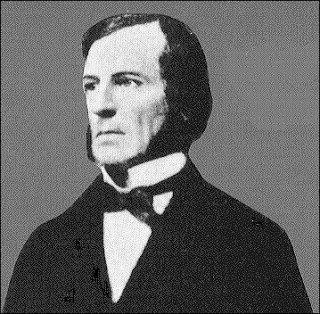Bite My Byte
George Boole
On yesterday’s radio
program, the idea of small quantities and the words that express them came up.
They included words such as
- tad [1940] a small amount. Possibly from tadpole, the early stage
of a frog or toad.
- skosh [1951] a small amount. From the Japanese sukoshi, a little or short. The word was picked up
by soldiers stationed in the orient.
- dab [1729] a small or trifling amount. From
a dialectical use of the word that meant a slight blow or slap with the
back of the hand.
- smidgeon [1845] a small amount. Possibly a variation of smitch
[1840], a particle or bit.
- bit
[1200] a small amount
(of food). From bite.
- jot [1526] a very small amount. From iota, the smallest Greek letter.
- speck [1400] A small or minute particle of
something. From the Dutch speckle, a speck.
- nip [1736] a small quantity (of spirits).
Possibly from the Dutch nippen,
to sip.
- scintilla [1686] a minute particle. From the
Latin scintilla, a
minute particle.
- mite [1375] an insignificant amount.
Figurative use of a Dutch word that meant a small coin of low value.
- shred [1000] a scrap or fragment. From a
Frisian word meaning a clipping from a coin.
- ort [1325] a scrap or fragment (of food).
From a Frisian word meaning fodder left by cattle.
The mention of bit being derived from bite prompted listeners Hugh, Chris, and Dave to
bring up the word byte, a group of eight consecutive bits operated on as a unit
in a computer. In 1956, IBM’s Werner Buchholz came up with the spelling byte to
avoid confusion with bit or bite.
They also pointed out
that computer logic was Boolean, raising the question, where did that adjective
come from? Aristotle’s classic version of logic was based on two types of
propositions: true or false. George Boole wrote a book in 1854 with the lengthy
title, An Investigation of the Laws of Thought, on Which Are Founded the
Mathematical Theories of Logic and Probabilities. He laid the foundations of Boolean algebra,
which transposed Aristotle’s true/false into 1/0. Boole had no way of knowing
that this concept would lead, a century later, to computer operations.
Available from McFarland & Co.: Word Parts
Dictionary, 2nd edition
Nook edition
Nook edition
Listen to Mike’s program
in real time every Tuesday morning, 9:10 - 10:00 a.m. EST, by going to
wtcmradio.com and clicking on Listen Now. You’ll also find about a month’s worth of podcasts there under The
Ron Jolly Show.
Visit The Senior Corner, a web site containing
information for senior citizens.



Comments